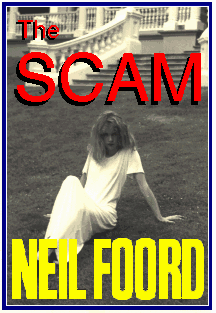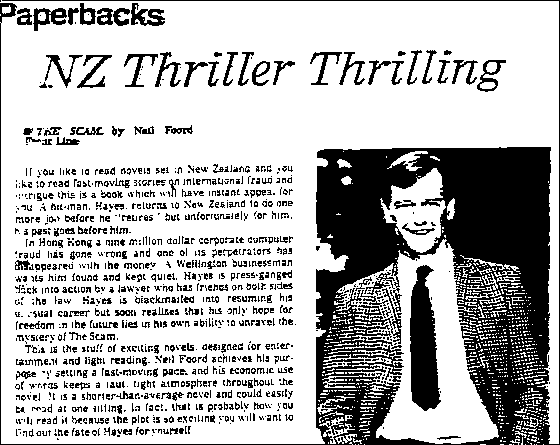|
|
|

|
The Chronicle, Levin The Scam starts and ends in New Zealand with excursions to Hong Kong, Chicago and New York. The characters are Kiwi, Chinese and American. It opens in Queenstown at the famous gondola ride, where Spence ends his climb to the top. Three shots. Dead certain. An account settled. Hayes returns to Plimmerton to settle down but a Christchurch lawyer with friends on both sides of the law blackmails him back into action. A multimillion-dollar computer fraud has gone wrong. The Hong Kong partner disappears with the money. Wellington businessman Bretton Clifford wants him found and the money returned before anyone starts talking about the fraud. The hunt moves through Hong Kong to the USA then back to New Zealand. Hayes seems to have it under control -- but that's why crime is so fascinating for the participants, it's so predictable. It's a story of deceit and vengeance, of war behind closed doors when the pinstripe boys get stuck in. It's tense, it's too fast. A new breed of novel for today's Kiwi. The Scam is, of course, fiction but it is so real you have to ask yourself how much is true. New Zealand is not immune to international crime -- it has already demonstrated its involvement. The Mr Asia syndicate was only the most publicised of these in recent years. There's enough on our streets and behind closed doors downtown for many more adventure stories. The Scam is an international thriller with indigenous villains.' |
 |
|
[Gore Ensign] Writer and artist Mary-Anne Bourke examines a New Zealand novel which is provoking unusual comment here and overseas, one which just had to appear- a book that could make the world sit up and take notice. And it has appeared, a thriller among the gorgeous scenery for which New Zealand is renowned. Kiwis reading The Scam will have to admit they and their country have grown up now and can be interesting. Goodbye to cultural cringe, suddenly head office in Wellington and sleazy clubs in Dunedin are as scintillating to read about as anything in New York or Hong Kong. Neil Foord's ultra-modern thriller zips you through the airports, flash hotels and smelly waterfronts of these places at the breakneck speed of the hot cars he sets running on lonely roads in the South Island. SIMPLE PLOT The plot of The Scam is simple but Foord has structured the story so that the getting there is a lot of fun. The author is well aware that readers are used to rich and racy images blatting across the page and the screen. The narrator moves in cinematic flashes, displaying the action directly and vividly. The reader is credited with some native intelligence and has to make connections between passages. Foord prefers not to state the obvious -- the scenes he does show are the hot and tricky, the telling details. PROSE It's meant to be seen, not just read. Foord takes full advantage of the unique facility of prose to shift back and "gossip" tellingly about what the characters are up to, and to slide in and out of their points of view. These pinstripe Kiwi crims are indicted by the dialogue which punches out the tight vernacular of the Kiwi underworld. The author's cool tone conveys the attitude that none of the story's elements should surprise or shock -- if you are clued up. If you are not with it this book will drag you, gasping and complaining, into the present. With this laidback truth-telling, the story rips along without suffering from moral drag. It is not until the very end when the themes of loss, coercion and treachery are clinched in serial climaxes that we discover that the authors prime concern is exactly what it seemed, a steely realism. CHARACTERISATION The treat, though, is characterisation. Our hero is an ordinary bloke under pressure despite his stable of cars [well he worked for them, eh] and like all Kiwis can turn into a well oiled action machine when necessary. Cast in the man alone mould, Hayes is not fully known until the novel draws to a close, though our acquaintance with him deepens gradually with clues throughout to his post- emotional personality. We can readily sympathise with Sarah, the disappointed and mutinous corporate wife. Her character is so well conceived and drawn that we want more of her. The author however chooses to tantalise rather than to serve up what we expect - - just like real life, see. Foord turns out to be a master of suspense and surprise - the story builds which leave you breathing faster right up to the last twist of the knife.' |
| Read the first scenes |
|